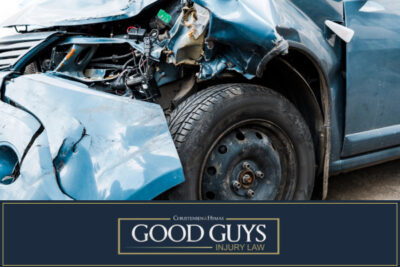
After the shock of a car accident, dealing with repairs and insurance can feel overwhelming. Getting reimbursed for vehicle repairs after a crash takes time, especially when you’re dealing with the other driver’s insurance company. You need to file an insurance claim, get your car fixed, and make sure all repair costs are covered.
This guide will help you through the claims process to get fair compensation. At Good Guys Injury Law, we help Utah drivers deal with insurance companies after car crashes.
Table of Contents
Your Rights After a Car Accident
In Utah, the system for handling car accidents is based on determining fault. This means that the driver responsible for causing the crash is liable for paying for your vehicle’s damages. Their driver’s insurance company should cover your car repairs, rental car expenses, and other costs. But insurance companies try to pay as little as possible.
As a crash victim in Utah, you have important rights when seeking reimbursement. You can choose your own repair shop instead of the insurer’s “preferred” shop. You can ask for original parts instead of cheaper aftermarket parts. You can also dispute low settlement offers if you have proof of higher repair costs.
Many victims take whatever the insurance company first offers, not knowing they can ask for more money. The insurance adjuster’s job is to settle claims cheaply, not fairly.
What Compensation You’re Entitled To After a Crash
After a car accident that wasn’t your fault, you can claim several types of compensation. This includes full payment for vehicle repairs or the fair market value if your car is a total loss. You can also claim rental car costs while your vehicle is being fixed.
Even after repairs, your car may lose value. This is called “diminished value,” and you can seek reimbursement for this difference from the at-fault driver’s insurance company.
When the Other Driver is At Fault
When another driver causes your accident, their insurance company should pay for your vehicle damage. Filing a property damage claim with their insurer can be challenging because they have no relationship with you and little reason to treat you fairly.
Their goal is to pay you as little as possible for necessary repairs. They might delay responses, question the damage, or try to blame you. Never admit fault after an accident—even partial blame can reduce your compensation under Utah’s laws.
Who Pays for Vehicle Damage After an Accident?

Who covers your repair costs depends on who caused the accident and what insurance coverage exists. If the other driver was at fault, you have two main options: file a claim with their insurance company or use your own collision coverage and let your insurer seek money from the other company.
Each approach has pros and cons. Filing with the at-fault driver’s insurance means no deductible, but the process can be slower. Using your own auto insurance policy means paying your deductible upfront (though you might get it back later), but the process is often faster since your own insurance company works for you.
If you caused the accident, your collision coverage will pay for your car repairs minus your deductible. If you don’t have collision coverage and you’re at fault, you’ll need to pay out of pocket to get your car fixed.
The Step-by-Step Claims Process
Getting reimbursed for vehicle repairs follows a standard process, though details vary between insurance companies. Understanding these steps helps you avoid delays and get fair compensation.
Here’s the step-by-step claims process:
- Report the car crash to the police and both insurance companies right away. Utah law requires reporting accidents with injuries or more than $1,500 in property damage.
- Get repair estimates from 2-3 repair shops to compare costs and coverage.
- Gather all documentation, including crash photos, repair estimates, and rental car receipts.
- Submit your claim with complete documentation to the insurance company.
- Review the settlement offer from the insurance adjuster. This first offer is rarely their best.
- Negotiate if the offer falls short by comparing it to your repair estimates and costs.
- If you can’t reach a fair deal, use your insurer’s dispute process or seek free consultation with a lawyer.
Keep records of all talks with the insurance company. Note the date, time, who you spoke with, and what was discussed. Insurers in Utah must acknowledge claims within 15 days and accept or deny them within 30 days after receiving proper documentation.
Getting Accurate Repair Estimates

Insurance companies often push you toward their “preferred” repair shops. While these body shops may offer faster service, they have deals with insurers that can lead to cutting corners. They might use aftermarket parts or rush repairs to keep costs down.
You have the right to choose your own repair shop. Get estimates from both insurer-recommended shops and independent shops you trust. Ask if they use original manufacturer parts, especially for safety components. For newer vehicles, you can often demand original parts instead of aftermarket replacements.
Take detailed photos of all vehicle damage before repairs begin, and question any items on the estimate that don’t seem right. This will help you seek proper reimbursement for all necessary repairs.
Dealing with Insurance Companies
When dealing with insurance companies after a motor vehicle accident, remember their goal is to pay you as little as possible. Even your own insurance company will try to minimize costs, though they typically treat you better than the other driver’s insurer.
Insurance adjusters are trained to settle claims cheaply. They use various tactics to reduce payouts, from questioning necessary repairs to suggesting cheaper parts. They know most car owners don’t understand repair costs or insurance policies well enough to challenge them.
Be polite but firm when talking with the insurer. Follow-up phone calls with emails summarizing what was discussed. If adjusters make promises, ask them to put those in writing to create a paper trail that will help your claim.
Common Tactics Insurance Companies Use to Reduce Payouts
Insurance companies use several tactics to pay less for your repairs. They often apply excessive depreciation, claiming parts were already worn before the accident. Another tactic is pushing for aftermarket parts instead of original parts. While aftermarket parts cost less, they may not fit as well or work the same as original parts.
The insurance company may also claim certain damage existed before the accident or isn’t related to the crash. This is why taking photos of your vehicle regularly helps—you can prove its condition before the accident and get full reimbursement.
How to Negotiate with Claims Adjusters
When negotiating with claims adjusters, be specific about what you’re asking for. Instead of just saying their estimate is “too low,” point out exactly what’s missing: “Your estimate doesn’t include the frame alignment that three shops say is necessary.”
Support your position with documentation from repair shops explaining why certain procedures or parts are needed. Research typical costs for your specific repairs to show that your requests are reasonable. If the adjuster won’t budge, ask to speak with their supervisor.
When Your Car is Totaled

In Utah, a car is typically declared a total loss when repair costs plus salvage value equal or exceed 75% of the vehicle’s actual cash value. When this happens, instead of paying for repairs, the insurance company offers a settlement based on what your car was worth before the accident.
Insurers must pay fair market value, not just “book value” from guides like Kelley Blue Book. Fair market value considers your specific car’s condition, mileage, features, and the local market.
If your car is declared a total loss, focus on proving what it was really worth. Find listings for similar vehicles in your area with similar mileage and features. Keep records of upgrades or maintenance that increased your car’s value, such as new tires or a recent timing belt replacement.
Recovering Additional Expenses
Beyond vehicle repairs and rental cars, you may get money for other accident-related expenses. Personal property damaged in the crash—like laptops, phones, child seats, or other items—may be covered under the at-fault driver’s property damage liability.
Child safety seats should always be replaced after a moderate or severe crash, even if they look fine. Most insurance companies will pay for this without much argument.
You might also recover lost income for time spent dealing with repairs or attending meetings with insurance adjusters. Storage costs for your damaged vehicle can be reimbursed if there’s a delay in the repair process. These financial burdens add up quickly but are often overlooked in settlement offers.
How a Personal Injury Lawyer Can Help
While many people think lawyers only help with injury claims, we also assist with vehicle damage disputes. A personal injury lawyer can help with property damage claims, especially when large amounts are at stake or when insurers act unfairly.
Insurance companies often undervalue totaled vehicles by using outdated data or inappropriate comparisons. With proper documentation and legal representation, car owners can receive thousands more in their settlements.
Lawyers understand insurance policies, coverage limits, and company tactics in ways most people don’t. We know when offers are fair and when they’re not. We can also handle all communications with adjusters, saving you time and stress during an already difficult period.
Most importantly, we work on contingency fees—meaning we only get paid if we win you more money. There are no upfront costs, making legal options accessible when you need them most.
Contact Our Personal Injury Lawyer for a Free Consultation

Don’t let insurance companies pay you less than you deserve after a car accident. At Good Guys Injury Law, our Utah personal injury lawyers know how to fight for the full value of your vehicle damage claim. We’ve helped many crash victims throughout Utah get fair treatment from insurance companies.
Contact us today for a free consultation about your case. We can review your insurance claim, explain your legal options, and help you decide if you need representation. Remember, insurance companies have teams working to minimize payouts—shouldn’t you have someone fighting just as hard for you?
